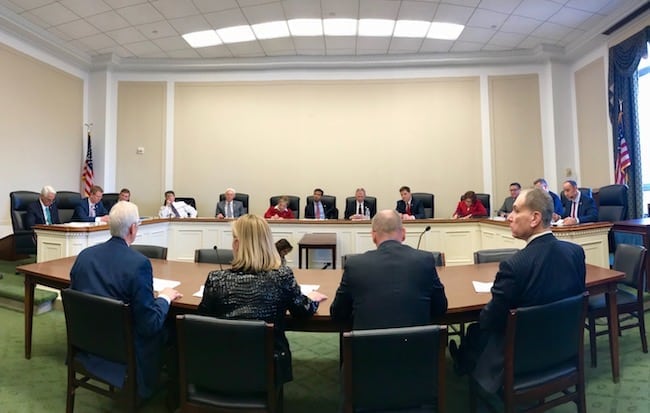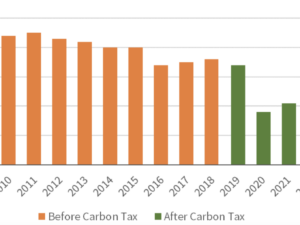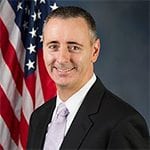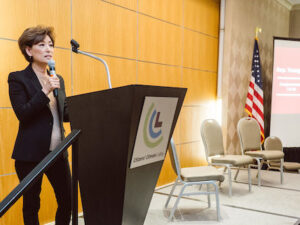
Experts from the energy efficiency sector (foreground) brief members of the Climate Solutions Caucus. (Photo by Jay Butera)
By Steve Valk
Part of the mission of the bipartisan Climate Solutions Caucus is to educate members about technologies and policies that have an impact on our ability to mitigate and adapt to climate change. To that end, the caucus holds briefings with experts from various fields to inform members and staff. These briefings can be the genesis of bipartisan legislation when members hear about promising solutions and start thinking about ways to bring these solutions to scale.
On Feb. 14 the caucus held a briefing on energy efficiency, considered by many experts to be a critical starting point for reducing greenhouse gas emissions. Members heard from Kateri Callahan, President of Alliance to Save Energy, Paul Camuti from Ingersoll Rand (parent company of Trane Heating and Cooling Systems), and Jeff Eckel from Hannon Armstrong, a company that provides financing for energy efficiency projects. They also heard from David Nemtzow of the Office of Energy Efficiency and Renewable Energy at the U.S. Department of Energy.
So, how much of an impact can energy efficiency have on climate change? A 2016 report from the International Energy Agency looked at what could be done to meet the goals of the Paris Climate Agreement and found that energy efficiency could account for nearly 40 percent of the solution.
“Energy efficiency is the first place to start when you’re looking for bipartisan solutions to climate change,” ASE’s Callahan said in an email, “and hopefully we gave the caucus a better understanding of how improving energy efficiency and energy productivity is as much of an economic opportunity as it is an environmental opportunity.”
And the economic opportunity is quite substantial. Some 2.2 million people are employed in the energy efficiency sector, whether in the manufacture of materials or in the installation of energy-saving projects. “And these are jobs that can’t be outsourced,” said ASE spokesperson Ben Evans. By comparison, only 70,000 people work in coal jobs.
At the briefing, caucus co-chair Rep. Carlos Curbelo (R-FL) asked if carbon pricing would have an impact on energy efficiency projects, to which the panelists replied that it would provide a boost.
In a follow-up interview, ASE’s Evans said, “Energy efficiency is one of cheapest and fastest solutions. If there is a price on carbon, and if organizations and individuals are looking to reduce what they’re paying for those carbon emissions, energy efficiency is one of the first places they’ll turn. We believe it would drive energy efficiency across the economy.”
Other panelists at the briefing also emphasized the economic opportunity with energy efficiency. “As much as we’ve achieved in energy efficiency, there’s as much opportunity ahead of us as we’ve already realized,” said Ingersoll Rand’s Camuti.
Eckel from Hannon Armstrong said, “The decentralization, digitization and decarbonization in the energy sector is the largest investment opportunity I’ve ever seen in my lifetime.”
As much as the panelists may have informed and inspired members of the caucus who attended, the caucus also inspired at least one panelist.
“It’s so refreshing to see lawmakers from both sides of the aisle come together for smart conversations about reducing carbon emissions and addressing climate change,” said ASE’s Callahan. “I want to thank the caucus for holding the event and would encourage the extremists on both sides to stop sniping and get engaged in the discussion on how we can grow this movement.”





